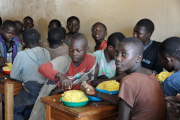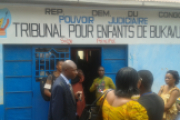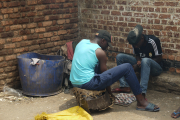Education is one of the essential prerequisites for combating poverty and dependency. In recent decades, the literacy rate has increased significantly, but 13 percent of the world's population still cannot read or write. Alongside this, however, integration, equal rights or the creation of a community-oriented group consciousness are also social target dimensions of our project work.
Sign of Hope makes a fundamental contribution to improving individual life perspectives here with local partners. For example, in South Sudan and on the Sunderban Islands in India, we support the school operations of partner organisations in order to be able to ensure basic educational opportunities, especially in remote regions. In the slums of Calcutta, a basic and vocational training program supports disadvantaged young people and women in an urban context. A street children's program in the DR Congo helps the social and vocational reintegration of children and young people who previously saw no other option for themselves than a life on the streets. In Vietnam, an earlier project focused simultaneously on the inclusion and education of restricted population groups. Thus, basic education and vocational training come together with advocacy work and awareness-raising measures for the social recognition of marginalised groups.
Our areas of action are often interwoven: Regardless of the field of action, sectoral training and education activities are characteristic of the majority of our projects, which directly provide aid recipients with further knowledge and skills for an increasingly self-determined future. Knowledge on cross-cutting issues such as health, environmental awareness, climate change and respect for human rights is also imparted in order to effectively empower our target groups in the spirit of helping them to help themselves.


 Donate now
Donate now













